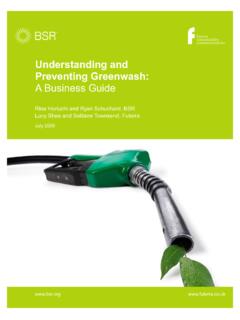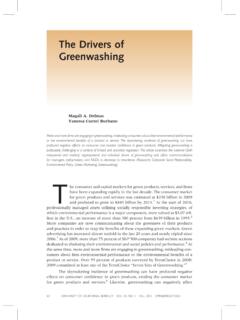Transcription of Greenwashing in the New Millennium
1 Greenwashing in the New Millennium Nancy E. Furlow Marymount University As the price of gasoline continues to rise and Americans are suddenly aware of environmental issues, a growth in green products has flooded the marketplace as well as the car lot. Whether a result of our sudden environmental conscience, or an attempt to downsize vehicles and our homes, green marketing is once again in style. Many marketers are again revisiting the value of promoting their products as being green to attract a growing environmentally aware segment. In attracting a green audience, companies often use claims that sound environmental, but are actually vague, and at times may be false.
2 This multitude of vague environmental claims has caused consumers to question corporate honesty. The concern over Greenwashing is not only that it mislead consumers, but also that if unscrupulous marketers continue to claim to be environmentally friendly, then companies true to their environmental mission lose their competitive edge. INTRODUCTION In the early 1990s, we saw a rapid rise in products touting environmental claims. The green phenomenon of the 90s disappeared as rapidly as it appeared, but today many manufacturers are again revisiting the value of promoting their products, or even themselves, as being green to attract a growing environmentally aware segment.
3 In attracting a green audience, companies often use claims that sound environmentally friendly, but are actually vague, and at times may be false. As a result, Greenwashing has become commonplace in our market. Greenwashing is the dissemination of false or incomplete information by an organization to present an environmentally responsible public image. The proliferation of environmental disinformation, or Greenwashing , has become so common and is of such a concern, that EnviroMedia developed the Greenwashing Index to monitor environmental claims used by manufacturers (Miller, 2008). On the web site, anyone can post ads deemed to be misleading and rate how the deception compares with other ads.
4 Is the result of the incredible growth of green claims in the past few years. The site allows consumers an outlet to express concerns and raise questions about these environmental claims. By giving the public a channel to judge these messages, consumers have put marketers on guard that environmental claims will not go unchecked. Journal of Applied Business and EconomicsTWENTY-FIRST CENTURY CASES When pointing to Greenwashing , one of the most cited examples is Ford Motor Company s It Isn t Easy Being green campaign for the hybrid Escape SUV. While touting itself as being environmentally friendly, Ford's cars were considered the worst carbon emitters and had the worst fuel efficiency trend of any major automaker according to Union of Concerned Scientists (Friedman & Mackenzie, 2004).
5 Since its early and much-criticized entry into the hybrid market, Ford has backed away from promoting itself as the green car choice. General Electric has also been cited as a greenwasher. The company s EcoImagination campaign highlights the work the company is doing in the environmental arena, but GE s environmental practices have been largely criticized. In 2000, GE went as far as the Supreme Court to fight the new clean air EPA requirements. Moreover, GE is still fighting an EPA-ordered clean up of the Hudson River where it dumped PCBs between 1940 to 1977, not to mention the other dozen or so superfund sites it is still fighting (Source Watch, 2008).
6 Today, one of the companies most lauded for its awareness is also on of the most denounced. In an industry considered to be anything but environmentally friendly, petroleum giant BP has decided to label itself as the green oil company. Admittedly, the company is not as brown as other oil giants, but by claiming to be earth conscious, BP has set itself up to be widely criticized. Since 2000, BP has used the tag line Beyond Petroleum as part of its green campaign. The overhaul of BP s image has been celebrated by some as a rebranding success and decried by others as a perfect example of Greenwashing (Solman, 2008).
7 BP s less than green activities include lobbying efforts to open restricted spaces such as the Arctic National Wildlife Refuge to drilling and illegally dumping hazardous waste from the Endicott Island oil field between 1993 and 1995. The company was even named as one of the 10 worst companies in 2005 by Multinational Monitor. Most recently, BP was forced to shut down operations in 2006 in Prudhoe Bay as the result of a ruptured decayed pipeline. Even with its questionable environmental track record, BP has undoubtedly been successful in painting itself green . BP ranked highest among energy companies for being green in the ImagePower green Brands Survey conducted last year and 49 percent of respondents felt that BP had become greener in the past five years (Solman, 2008).
8 FALLOUT FROM Greenwashing The multitude of vague and misleading environmental claims has caused consumers to question corporate honesty, and cry Greenwashing at every turn. The concern over Greenwashing is not only that it misleads consumers, but also that if unscrupulous marketers continue to claim to be environmentally friendly, then companies true to their environmental mission lose their competitiveness. In addition, overuse and misuse of the green claims can saturate the market to the point that the greenness of the product may become meaningless to the consumer (Zimmer et. al, 1994). Another reason why consumers may be suspicious of green advertising claims is that the scientific knowledge required to understand many environmental issues is often complex and subject to change, thereby making it difficult for the general public to comprehend.
9 In addition, comparisons made between products are frequently limited to a single environmental benefit, making the claim incomplete and misleading (for example paper vs. plastic). Whole Foods is under attack for this very reason. The Environmental Affairs Council filed action last year with Journal of Applied Business and Economicsthe Federal Trade Commission over the grocery chain s claim of greenness for using only 100% recycled paper bags (Enviros to FTC, 2008). MANAGERIAL IMPLICATIONS The implications of Greenwashing are wide spread. Consumers may become confused about which products actually do help the environment.
10 Because of increased consumer skepticism, legitimate attempts by companies to become less environmentally harmful will lose any competitive edge they might have gained. Finally, there will be fewer rewards and therefore less motivation for companies to make environmentally helpful products, as consumers will discount all environmental marketing claims. Therefore, in the end, inaccurate environmental marketing will not only hurt consumers and firms, but it will also harm our environment (Polansky, et. al, 1998). If the consumer finds the claim to be unreliable, they are likely to disregard all environmental claims, thereby avoiding any product that may in fact be better for the environment (Mayer, et.)






